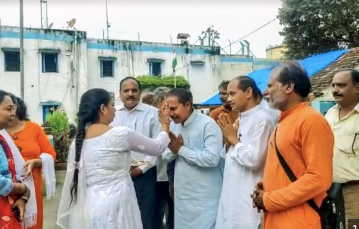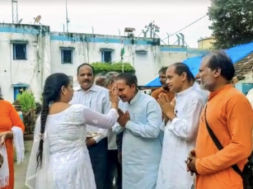
Supreme Court Quashes Early Release of Bilkis Bano Rapists, Gives Them Two Weeks to Return to Jail
Manas Dasgupta
NEW DELHI, Jan 8: The 11 men convicted of raping Bilkis Bano and killing her family members during the infamous 2002 Gujarat riots but released early by the Gujarat government, will have to return to jail with the Supreme Court on Monday quashing the order of the state government for “abuse of discretion.”
The apex court has given the convicts two weeks’ time to surrender cancelling the Gujarat government’s order of August 2022, for early release granting them remission for “good behaviour” in jail. The court said the Gujarat government was not competent to release the men in 2022, the Supreme Court said in its landmark order on a decision that had triggered nationwide condemnation.
“The exemption order lacks competence,” the Supreme Court said, berating the Gujarat government for passing such an order “without application of mind”. Criminals can be released only by the state where they are tried, which is Maharashtra in this case. Justice B.V. Nagarathna, heading a Bench also comprising Justice Ujjal Bhuyan, said. The court held that the convicts were tried and sentenced in Maharashtra. It was Maharashtra, and not Gujarat, which had to consider and remit their sentence.
Justice Nagarathna, in a detailed pronouncement of the judgment which spanned nearly an hour in open court, said Gujarat “usurped” the power of Maharashtra to pass an order of remission in favour of the convicts. “We strike down the remission on the ground of usurpation of power. Gujarat had no jurisdiction,” the court held. Justice Nagarathna said Gujarat was not the “appropriate government” under Section 432(7)(b) of the Code of Criminal Procedure which covered the subject of power to suspend and remit sentence.
The judge said it was clear from Section 432(7)(b) that the government of the State where the incident had occurred or the convicts were imprisoned was not authorised to grant remission. The authority rested solely with Maharashtra, to where the case was transferred and where the convicts were tried and sentenced to life imprisonment. “The power to grant remission is the discretion of the appropriate government. But they have to act within their powers in accordance with the law, and not in an arbitrary and unreasonable manner or through an improper exercise of discretion,” the court noted.
Justice Nagarathna said the grant of remission to the men by Gujarat was an “abuse of discretion.” It amounted to usurpation of the power of remission when the authority given by law to one authority was exercised by another. The rule of law had been breached as the remission order was passed by an incompetent authority.
Petitioners had argued that both the trial judge in Mumbai and the Central Bureau of Investigation, which was the prosecuting agency, had disagreed with the proposal to release the convicts. The Centre had however endorsed the early release.
The Bench refused to invoke its extraordinary power under Article 142 of the Constitution to let the convicts remain at liberty despite the cancellation of their remission order. The convicts’ lawyers had urged the court to take an empathetic view. They contended that the men had served 14 years of their sentence before their release.
“This will be a transgression of the rule of law. Deprivation of liberty to the convicts is justified… Rule of law does not mean the protection of a fortunate few,” Justice Nagarathna observed. The court noted that they enjoyed spells of “liberal parole” while in prison.
Ordering status quo ante, Justice Nagarathna, speaking for the Bench in the judgment, reasoned that for the convicts to apply for remission again they have to be back in prison first. Sending the men back to prison was only a “natural consequence” of the striking down of Gujarat’s remission order.
“Having quashed their remission, should they be sent back to prison? Should their liberty be protected? Compassion and sympathy has no place before the rule of law. Rule of law is dispassionate, objective… If the rule of law is violated, the rod of law should descend to punish… Rule of law is the antithesis of arbitrariness,” Justice Nagarathna said.
Dwelling on the question of whether the convicts must go back to jail in the context of their right to personal liberty, the top court decided that allowing them to remain out of prison would amount to validating “invalid orders”. “The rule of law must be preserved unmindful of the ripples of the consequences,” said the judges.
The Supreme Court came down heavily on its own judgment of May 2022, delivered by Justice Ajay Rastogi (retired), which allowed the convicts to appeal to the Gujarat government for their early remission. The convicts got the order “through fraudulent means”, the judges said. They also noted that the Gujarat government should have sought a review of the 2022 order.
The Bench nullified the May 2022 order of the Supreme Court which had allowed Gujarat to invoke its remission policy of 1992 to release the men. It said the order was procured through misrepresentation and suppression of facts. The exercise undertaken to get the May 2022 order was “vitiated by fraud.” The respondents had come to the Supreme Court with “unclean hands.”
The convicts were released by the Gujarat government on the basis of an obsolete 1992 remission policy, which has since been superseded by a law in 2014 that bars the release of convicts in cases of capital offence.
After the Supreme Court asked Gujarat to take a call on the remission petition of one of the convicts, Radheshyam Shah, the state government consulted a panel that included men linked to the state’s ruling BJP. The panel justified approving the release of the convicts saying they were “sanskari (cultured) Brahmins” who had already served 14 years in prison and had displayed good behaviour.
The convicts were given a hero’s welcome, with garlands and sweets, on their early release and were later seen sharing stage with a BJP MP and an MLA. Convict Radheshyam Shah had even started practising law, the Supreme Court was told during an 11-day hearing last year of petitions challenging the release, including one by Bilkis Bano.
Petitioners against the convicts’ release included Trinamool Congress’ Mahua Moitra, CPM Politburo member Subhashini Ali, independent journalist Revati Laul and former vice-chancellor of Lucknow University Roop Rekha Verma, among others.
The Supreme Court had asked tough questions and had commented that the Gujarat government was on “thin ice” over its decision. Justices Nagarathna and Ujjal Bhuyan had asked the Centre and the Gujarat government to submit the original records related to the remission.
Bilkis Bano was 21 and five months’ pregnant when she was gang-raped while fleeing during the communal riots that broke out after the fire in Sabarmati Express in which 59 kar sevaks were killed. Her three-year-old daughter was among the seven family members slaughtered in the riots.













